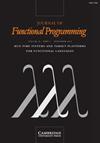功能反应系统的运行时验证和确认
IF 0.6
3区 计算机科学
Q4 COMPUTER SCIENCE, SOFTWARE ENGINEERING
引用次数: 2
摘要
许多类型的交互式应用程序,包括在硬件中实现的响应式系统,交互式物理模拟和游戏,在测试和调试时提出了特别的挑战。原因包括事实上缺乏可再现性和难以自动生成合适的测试数据。本文证明了在纯函数式语言中实现的函数式响应式编程(FRP)的某些变体可以通过在整个程序级别提供参考透明度来减轻这些困难。这为跨平台的测试和调试提供了一个多管齐下的方法,包括基于时间逻辑的断言,记录和重播运行(也来自已部署的代码),以及使用QuickCheck的自动随机测试。当与允许约束副作用的可扩展FRP形式相结合时,它不仅允许我们验证软件模拟,还允许我们分析反应系统中故障的影响,确认容错机制的有效性,并执行软件和硬件在环测试。该方法已经在几个现有FRP实现中实现的重要系统上得到了验证,通过使用一个工具进行仔细调试,该工具允许在审查下控制测试或模拟,沿着执行时间线移动,并在个人计算机和外部设备上精确指出违反断言的情况。本文章由计算机程序翻译,如有差异,请以英文原文为准。
Runtime verification and validation of functional reactive systems
Abstract Many types of interactive applications, including reactive systems implemented in hardware, interactive physics simulations and games, raise particular challenges when it comes to testing and debugging. Reasons include de facto lack of reproducibility and difficulties of automatically generating suitable test data. This paper demonstrates that certain variants of functional reactive programming (FRP) implemented in pure functional languages can mitigate such difficulties by offering referential transparency at the level of whole programs. This opens up for a multi-pronged approach for assisting with testing and debugging that works across platforms, including assertions based on temporal logic, recording and replaying of runs (also from deployed code), and automated random testing using QuickCheck. When combined with extensible forms of FRP that allow for constrained side effects, it allows us to not only validate software simulations but to analyse the effect of faults in reactive systems, confirm the efficacy of fault tolerance mechanisms and perform software- and hardware-in-the-loop testing. The approach has been validated on non-trivial systems implemented in several existing FRP implementations, by means of careful debugging using a tool that allows the test or simulation under scrutiny to be controlled, moving along the execution time line, and pin-pointing of violations of assertions on personal computers as well as external devices.
求助全文
通过发布文献求助,成功后即可免费获取论文全文。
去求助
来源期刊

Journal of Functional Programming
工程技术-计算机:软件工程
CiteScore
1.70
自引率
0.00%
发文量
9
审稿时长
>12 weeks
期刊介绍:
Journal of Functional Programming is the only journal devoted solely to the design, implementation, and application of functional programming languages, spanning the range from mathematical theory to industrial practice. Topics covered include functional languages and extensions, implementation techniques, reasoning and proof, program transformation and synthesis, type systems, type theory, language-based security, memory management, parallelism and applications. The journal is of interest to computer scientists, software engineers, programming language researchers and mathematicians interested in the logical foundations of programming.
 求助内容:
求助内容: 应助结果提醒方式:
应助结果提醒方式:


